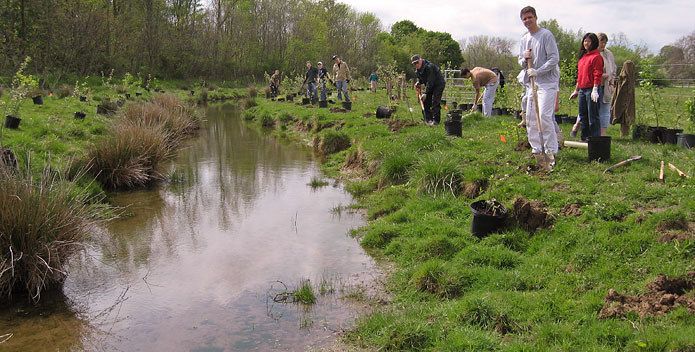At first glance, the federal Farm Bill, full of wonky agriculture policy and programs with countless acronyms, doesn't appear to have a connection with the health of the Bay and its rivers and streams. But upon further inspection, this legislation is crucial to Bay cleanup efforts.
Which is why we were thrilled to see a strong, Bay-friendly Farm Bill pass the House and Senate this week. The legislation, passed every five years, will provide critical resources to farmers across the country to implement smart, cost-effective conservation practices that protect our waters, farms, and way of life.
As we have discussed in the past, the most cost-effective way to reduce pollution to local rivers, streams, and the Chesapeake Bay is to implement agricultural best management practices, many of which are funded through Federal Farm Bill programs. These conservation practices are essential to implementation of the Chesapeake Clean Water Blueprint.
Farmers throughout the watershed are making major strides in reducing polluted runoff from entering our waters. But they can't do it alone. The Farm Bill provides them and the more than 83,000 farms across the region with the critical tools they need. And with agriculture as the largest source of pollution to our local waterways and the Chesapeake Bay, the resources that this bill provides are tremendously important.
The best way to ensure continued investments in conservation funding is to thank our legislators for a job well done. Take a moment and thank your leaders, particularly Senators Chris Van Hollen and Bob Casey, who worked tirelessly on this legislation and fought for the important conservation changes within it. Send them a message now!
This Week in the Watershed: Menhaden Madness, Oyster Recovery, and a Critical Bill
- The new Farm Bill, passed by the Senate and House and awaiting the President's signature, provides critical investments in conservation programs that are a major help for clean water. (WJZ—MD) BONUS: CBF Statement
- In a major win for clean water, Virginia Governor Ralph Northam proposed a major increase in the funds dedicated to alleviating urban and agriculture runoff in the next state budget. (Daily Press—VA) BONUS: CBF Statement
- A moratorium on the use of commercial docks for new aquaculture leases in Maryland's St. Mary's County will likely have a chilling effect on the growing aquaculture industry. (Bay Journal)
- The Trump administration's rollback of crucial federal regulations of streams and wetlands could cause irreparable harm to the Bay and its rivers and streams. (Capital Gazette—MD)
- Two thumbs up to this editorial praising grants rewarded to CBF and Lynnhaven River Now to restore the native oyster population in Virginia's Lynnhaven River. (Virginian Pilot—VA)
- A new bill introduced by Virginia Rep. Donald McEachin would address the need for action to address the climate change crisis. (Daily Press—VA)
- A CBF survey found the exciting news that oysters are slowly recovering in Maryland's Patapsco River. (Baltimore Sun—MD)
- The health of Maryland's Severn River is full of ups and downs. (Capital Gazette—MD)
- The proposed sustainable fishing certification for the Atlantic menhaden could undermine the health of this critical fish. (Virginia Mercury)
What's Happening around the Watershed?
January 9
- Annapolis, MD and Richmond, VA: Legislative session starts in both Maryland and Virginia—stay tuned for how you can take action for clean water in the Bay and your local rivers and streams!
January 12-February 11
- Throughout Virginia: Help restore the health of the Chesapeake Bay and Virginia's rivers by participating in CBF's Grasses for the Masses program. Participants grow wild celery, a type of underwater grass, in their homes for 10-12 weeks. After 10-12 weeks of grow-out, participants will gather to plant their grasses in select local rivers to bolster grass populations and help restore the Bay. With workshops held throughout Virginia, there's plenty of opportunity to get involved. Find a workshop near you!




